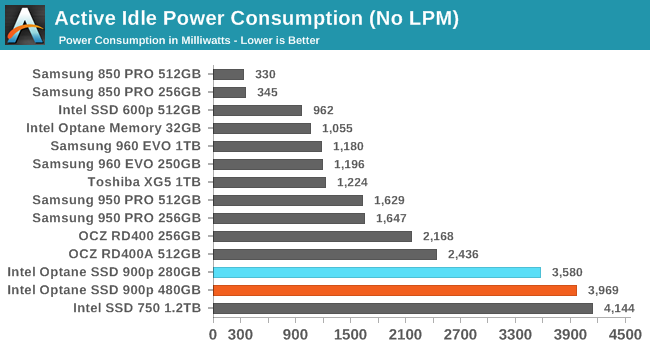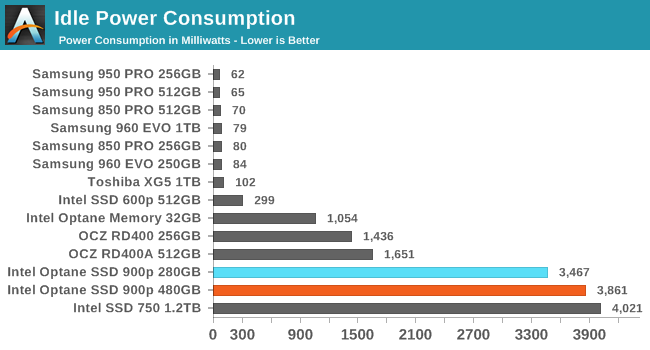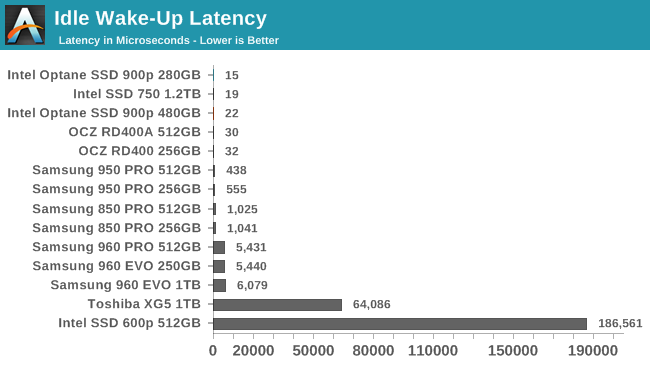The Intel Optane SSD 900p 480GB Review: Diving Deeper Into 3D XPoint
by Billy Tallis on December 15, 2017 12:15 PM ESTPower Management
Real-world client storage workloads leave SSDs idle most of the time, so the active power measurements presented earlier in this review only account for a small part of what determines a drive's suitability for battery-powered use. Especially under light use, the power efficiency of a SSD is determined mostly be how well it can save power when idle.
SATA SSDs are tested with SATA link power management disabled to measure their active idle power draw, and with it enabled for the deeper idle power consumption score and the idle wake-up latency test. Our testbed, like any ordinary desktop system, cannot trigger the deepest DevSleep idle state.
Idle power management for NVMe SSDs is far more complicated than for SATA SSDs. NVMe SSDs can support several different idle power states, and through the Autonomous Power State Transition (APST) feature the operating system can set a drive's policy for when to drop down to a lower power state. There is typically a tradeoff in that lower-power states take longer to enter and wake up from, so the choice about what power states to use may differ for desktop and notebooks.
We report two idle power measurements. Active idle is representative of a typical desktop, where none of the advanced PCIe link or NVMe power saving features are enabled and the drive is immediately ready to process new commands. The idle power consumption metric is measured with PCIe Active State Power Management L1.2 state enabled and NVMe APST enabled (when supported).


(idle power)

(idle wake-up)










69 Comments
View All Comments
Nottheface - Monday, December 18, 2017 - link
So are the origins of xpoint memory here as claimed:"Bronek Kozicki
Silver badge
Report abuse
Holmes
one last point
There's been so much speculation about what XPoint actually is. Well, it might be Cross-Point memory, pretty well documented few years ago - here . Unity Semiductor where this research has been conducted was acquired by Rambus in 2012 and, one year later, Micron and Rambus signed agreement giving Micron access to all Rambus patents (which would include Cross-Point IP), details here. The wording used ("... granted to Micron and its subsidiaries") would also explain why XPoint venture is majority-owned by Micron."
From:
https://forums.theregister.co.uk/forum/1/2016/04/1...
Nottheface - Monday, December 18, 2017 - link
So from this:https://web.archive.org/web/20121117195338/http://...
emvonline - Tuesday, December 19, 2017 - link
NOT: XPoint is the same memory Micron and Intel were working on 10 years ago. Unity/rambus work is not at all relatedl. Side note: Intel owns the Name X point and licenses it to Micron. Intel owns the IP jointly with Micron.emvonline - Monday, December 18, 2017 - link
Real world numbers:I looked at a different website and the numbers showed large impacts on benchmarks. But if you look at actual gaming service times, boot times, or load times, Optane is faster but not noticeably faster (<10% difference). Could I easily tell the difference between this and other NVMe SSDs when gaming?
djayjp - Tuesday, December 19, 2017 - link
Nope.djayjp - Tuesday, December 19, 2017 - link
You wouldn't even be able to tell the difference between this and the budget sata SSDsemvonline - Tuesday, December 19, 2017 - link
I agree... would love to get Anandtech to agree publiclyalbert89 - Thursday, January 4, 2018 - link
Intel have given me more reasons why their optane series is nothing more then a price gouge.And non of the paid up Intel fangirls like Jays2cents, Linus Gordon from PCworld, TomsHradware etc, are going to convince me otherwise.
Chaser - Thursday, January 25, 2018 - link
Tomshardware paints a completely different picture on rather unique user experience these drives provide gamers and enthusiasts.